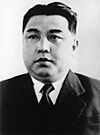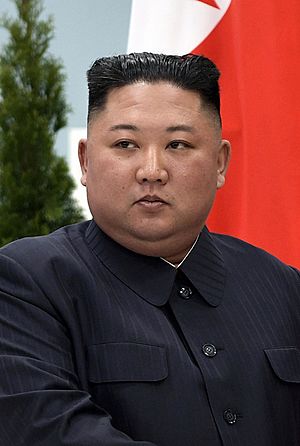Supreme Leader (North Korean title) facts for kids
Quick facts for kids Supreme Leader of theDemocratic People's Republic of Korea |
|
|---|---|
| Term length | Life tenure |
| Formation | 9 September 1948 |
| First holder | Kim Il Sung |
| Supreme Leader of the Democratic People's Republic of Korea | |
|---|---|
| Korean name | |
| Hangul | 조선민주주의인민공화국최고령도자 |
The title of supreme leader (Hangul: 최고령도자; MR: Ch'oego Ryŏngdoja) of North Korea generally means the de facto top leader of the Workers' Party of Korea, the state and the Korean People's Army. Most of North Korea's leaders, who are called Supreme Leader, were not called this until after their death, going by other names like "Great Leader" and "Dear Leader" during their lifetimes. The leaders of North Korea also go by many other names and titles, see the lists of titles of Kim Il Sung, Kim Jong Il and Kim Jong Un.
Overview
"Supreme Leader" was originally a designation used for Kim Il Sung only, and only after his death. During his lifetime he was known as "Great Leader" (위대한 수령), a title to this day that only refers to him. His son, Kim Jong Il, was known as "Dear Leader" (친애하는 령도자) during his lifetime, and only after death did North Korean media begin calling him "Supreme Leader", in the tradition of his father. The grandson, Kim Jong Un, was first called "Supreme Leader" in a North Korean newspaper article dated October 3, 2020, with the frequency increasing since then, including sometimes "great Supreme Leader". He was the first to be frequently called "Supreme Leader" while still alive, and at the relatively young age of 37. The 2020 newspaper article was part of the official preparations to appoint Kim Jong Un as the General Secretary of the Workers' Party of Korea ie. leader of the Workers' Party, the sole political body in the country and the paramount leader position. Since November 2021, South Korean media have all reported that Kim Jong Un is called "Supreme Leader" (Suryeong) in North Korea.
List
| No | Portrait | Name (Birth–Death) |
Title(s) | Period | Tenure (Time in Office) |
Ideological contribution(s) |
|---|---|---|---|---|---|---|
| 1 |  |
Kim Il Sung 김일성 (1912–1994) |
Premier of the Cabinet of the DPRK | 9 September 1948 – 28 December 1972 | 9 September 1948 — 8 July 1994 (45 years, 302 days) |
Juche |
| Chairman of the WPK | 24 June 1949 – 12 October 1966 | |||||
| General Secretary of the WPK | 12 October 1966 – 8 July 1994 | |||||
| President of the DPRK | 28 December 1972 – 8 July 1994 | |||||
| 2 |  |
Kim Jong Il 김정일 (1941–2011) |
Chairman of the National Defence Commission of the DPRK | 9 April 1993 – 17 December 2011 | 8 July 1994 — 17 December 2011 (17 years, 162 days) |
Kimilsungism Songun Ten Principles |
| General Secretary of the WPK | 8 October 1997 – 17 December 2011 | |||||
| 3 |  |
Kim Jong Un 김정은 (born 1982 or 1983) |
First Secretary of the WPK | 11 April 2012 – 9 May 2016 | 17 December 2011 — present (13 years, 130 days) |
Kimilsungism–Kimjongilism Byungjin |
| First Chairman of the National Defence Commission of the DPRK | 11 April 2012 – 29 June 2016 | |||||
| Chairman of the WPK | 9 May 2016 – 10 January 2021 | |||||
| President of the State Affairs Commission of the DPRK | 29 June 2016 – present | |||||
| General Secretary of the WPK | 10 January 2021 – present |
- Bold offices refer to the highest positions in the Workers' Party of Korea, the lone political party of North Korea.
Timeline

See also
- Eternal leaders of North Korea
- Kim family
- Government of North Korea
- North Korean cult of personality
- Residences of North Korean leaders
- Paramount leader, the Chinese equivalent


